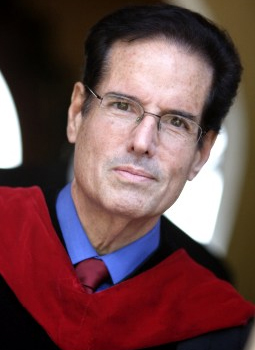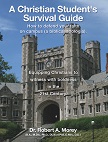Is Natural Theology a form of Deism?
By Robert A. Morey
Deism is alive and well today not only in liberal Protestantism but also in neo-Evangelical circles. It comes in many different forms. But at the bottom of the system lies several false and heretical assumptions.
Anti-Christian Deism:
In its openly anti-Christian form, Deism proclaims that human Reason is the sole Origin of truth, justice, morals, meaning, and beauty. This dogma arose out of the fundamental pagan Greek philosophic doctrine of human autonomy: Man is the measure of all things.
The Deist assumes that man's Reason is sufficient in and of itself to discover, judge, and defend the truth about everything. Thus Special Revelation, i.e the Bible, is unnecessary. Since it is unnecessary, it would be a waste of time for God to reveal it and a waste of time for us to read it. Thus both theology and philosophy can safely ignore the Bible.
But, if we are not to go to the Bible for our theology, where should we go? Deists claim they can find philosophical and theological "truth" in something they call "Nature." Hence the term "natural" theology.
The Word "Nature":
Now Deists love to use the word "Nature," but rarely define it. The word is not defined because most Deists assume that the meaning of such terms as "free will," "Reason," and "Nature" do not need any definition. They reflect the a priori concepts that form the presuppositional foundation of humanism.
The word "Nature" sometimes refers to the "universe" that is perceived, measured, and weighed by the five senses. But it can also refer to human "nature," i.e. man's reason, experience, and emotions. Thus we can discover and defend "truth" according to what we think it is, what we experience it to be, and what we feel it is. By this method the Deists can pretend that they have "objective" truth. But, in the end, they are stuck in the quicksand of subjectivism and relativism. Indeed, every Deist has his own “truth” according to his own “reason.” What one affirms as true – the other denies.
Another important assumption that goes along with human autonomy is "ontological" thinking that states that reality must conform itself to what I think is possible or impossible. For example, if I feel that miracles are simply not possible, then they cannot happen. As C. S. Lewis pointed out, if you begin with the assumption that miracles are not possible, you will end up concluding that miracles do not happen. Circular reasoning always ends up where it first began.
Most Deists reject such doctrines as the Trinity, the deity of Christ, the bodily resurrection, original sin, the atonement, eternal punishment, the inerrancy of Scripture, etc. as not being "in accord with Reason." If they acknowledge the existence of any deity, it is a finite god who cannot know or control the future.
Since Deists obtain their theology from "Nature," it is thus no surprise that they end up claiming that salvation can be found in and through "Nature" as well. Natural salvation is the inevitable corollary to natural theology. The biblical teaching that salvation only comes in response to faith in Jesus Christ is rejected as unreasonable and cruel. The heathen are saved if they live good lives and are sincere in their beliefs, whatever they are. The Catholic apologist Peter Kreeft is a good example of this kind of universalism.
"Christian" Deism:
Some pastors, theologians, and philosophers within the Evangelical community are Deists whether they acknowledge this or not. We leave to God to judge the hearts of Deists who claim to be evangelical Christians. It is quite possible for them to be a "Christian" in their hearts and Deists in their theology at the same time. Our criticisms of their "natural" theology and philosophy should not be taken as an ad hominem attack on their character or motives. They can kiss babies, pet dogs and be nice people but be utterly unbiblical in theology and philosophy.
While we admit that some Deists profess to be Christians, we must not be so naive as to think that just because someone claims to be a Christian this means that his theology or philosophy is automatically "Christian." Thus we will not be turned aside from criticizing someone's theology or philosophy because they claim to be a Christian. Far too many theologians and philosophers in Evangelical circles are Deists in their thinking. We must lovingly confront them and call them to repentance.
"Christian" Deists believe that what is revealed in the Bible will always be in accord with their "Reason" because their "Reason" has already determined beforehand what the Bible can or cannot teach. Thus man is the measure of all things -- including what the Bible can and cannot teach. The key is that man's "Reason" limits revelation.
For example, Clark Pinnock, Gregory Boyd, Stephen Davis, John Sanders and other "processians" determine a priori that God CANNOT know or control the future. Why? Their "Reason" tells them that man cannot be free and God be omnipotent, omniscient, and sovereign at the same time. Thus the Bible CANNOT teach that God knows and controls the future. This is why it is futile to show them the hundreds of verses that plainly teach the historic Christian view of God. Their circular reasoning prevents them from any exegetical considerations.
"Christian" Deists may loudly and dogmatically claim allegiance to the Bible, while being "practical Deists" by deciding such things as the nature and extent of God's knowledge by their "Reason" alone. For example, when Prof. Frank Beckwith of Trinity International University discussed what God can and cannot know in his book, The Mormon Concept of God, he did not refer to a single verse from the Bible. Evidently, we do not need the Bible to tell us about the nature and extent of God's knowledge! This is what we mean when we speak of those who are professing Christians and practical Deists at the same time.
A Test Case:
If it were possible for man by his Reason alone to obtain from Nature the knowledge necessary to construct a natural theology and to develop a philosophic worldview, what would be the ideal conditions under which this could take place?
A Perfect Man In A Perfect World:
Pre-lapsarian Adam and Eve were perfect in every respect. They had perfect minds as well as perfect bodies. Their reasoning abilities were perfect and, if it were possible for man to discover theological truth on the basis of his own reason, emotions and experience, now was the time for this to happen.
As Adam looked around him at the glories of Paradise, he had so many questions: Why did he exist? What was he supposed to do? What was the meaning of life and the things in life? How was he to treat the animals around him? How did he fit into the universe? What was he to eat? Was he to take an animal as his mate? Could he eat the fruit from every tree? What was right and wrong?
If natural theology were possible, surely Adam came up with the answers by sitting on a rock, resting his head on his hand, and thinking through all the logical possibilities. By his perfect reason, he could derive perfect answers. After all, there was no need for God to reveal the answers to Adam as he could discover them by the sheer power of his perfect intellect. Starting from himself, by himself and with himself apart from revelation, he could know that there was one tree in the garden whose fruit would bring death if he ate it. He could put his ear to a tree and it would tell him to tend the garden.
But, to the horror of all natural theologians, Adam could not discover a single answer to his questions. Man’s reason, emotions and experience could not tell him why he was created. He did not have a clue as to what he should do in the Garden. He could have put his ear to a hundred trees, but they would never tell him to tend the garden. He did not know what he could or could not eat. Even if he looked at the animals all day long, not one of them would have told him that he was to give them names. The forbidden tree did not look any different than any other tree in the garden.
And God Walked With Man In The Garden:
Adam was not created to be the Origin of truth, justice, morals, meaning and beauty. The Creator assumed the form of a man and walk with man in the Garden in the cool of the day. He would call Adam and Eve to come to him. They dropped whatever they were doing and walked and talked with the Son of God. They had so many questions and He had all the answers.
These daily sessions were Special Revelation. God told man why He created him and what he was to do in the Garden. He revealed to man what he could and could not eat. In other words, God was the Origin or Source of truth, justice, morals, meaning and beauty. Man’s responsibility was to receive what God revealed. Man was not the Origin but the receiver truth.
God Revelation Man
(Origin) (means) (receiver)
The Fall of Man Into Sin and Guilt:
The Fall of man is recorded in Genesis 3 and gives us some interesting information.
- If it were not for Special Revelation, we would not know that man had fallen from a state of righteousness, holiness and knowledge into sin. No pagan philosopher or natural theologian ever came up with the idea of the Fall of man into sin.
- Satan did not malign, mock or contradict man's reason, emotions or experience. He did not suggest that man should distrust his reason.
- Satan cast doubt on the reliability of Revelation when he asked, "Hath God said?" He then directly contradicted it when he said, "You shall not die." He maligned God's motives and cast doubt on the reliability of God's Word.
- Satan tempted man to become a natural theologian and philosopher! He told man to rely on his own reason; to exalt himself above God and His word; to sit in judgment of God's motives and attributes; to become his own god by becoming his own Origin of truth, justice, morals, meaning and beauty.
The Origin of Natural Theology:
From Genesis 3, we learn that the origin of natural theology and philosophy begins with the temptation of Satan, the Fall of man into the sin, and the heresy of human autonomy. Satan flipped everything backwards.
Man Reason God
(Origin) (means) (receiver)
After The Fall:
Since the pre-lapsarian world is not a good place for natural theologians, they usually omit any discussion of whether man from the beginning was the Origin or receiver of truth. They rush on to the post-lapsarian world with the assumption that fallen man in a fallen world can do what a perfect man in a perfect world could not do.
After sin entered the world, St. Paul argues in Romans that whatever knowledge man could have obtained from Creation is made void and null by his depravity. Thus Rom. 1:18 tells us that man "suppresses" whatever truth he might have obtained from creation. Thus man's depravity negates any possibility of natural theology.
Having suppressed any natural knowledge that could have led to a natural theology, man's depraved reasoning abilities led him into the darkness of vain, philosophic, speculations (Rom. 1:21-22). Man's "wisdom" i.e. his highest intellectual attainments, always leads to idolatry (Rom. 1:23).
This is why all the gods of the heathen are dismissed as demons by Paul in I Cor. 10:20. Thus the gods of Socrates, Plato, and Aristotle are just as demonic as a god made of coconut husks, pig's teeth, and seashell eyes.
Paul states that when the "rubber meets the road," man will never find the true God through human Reason (I Cor. 1:21). A fallen man in a fallen world can never by reason alone find the one true God in nature. The defect is not in general revelation but in the noetic effects of the Fall. The fact that no heathen philosopher or religious leader in the history of the world ever found the biblical God and the Gospel in nature is irrefutable.
This is why when Paul goes on to speak of Christian theology and philosophy (i.e. "God's wisdom" as opposed to man's wisdom), he dogmatically states it is not a product of "this age or the rulers of this age." The biblical world and life view cannot be discovered by the eye or the ear of man. Neither can it be discovered by the mind of man. It comes to us by the Special Revelation found in the words of Scripture. (I Cor. 2:6-16).
Christian Deists:
Ignoring the message of Romans and I Corinthians, evangelical Deists have assumed that Satan was right: We should sit in judgment of God, His existence, nature, ways and Revelation. Our reason, experience and emotions are on the throne, not God or His Word.
But once man enthrones his reason above all that is holy, what is the end result?
Many "evangelical" Desists have decided apriori that the immortality of the soul, a conscious afterlife, the eternal conscious punishment of all unbelievers, the lost state of the heathen, the inerrancy of Scripture, etc. are not in accord with "Reason." They claim that the Bible cannot teach anything that contradicts their "Reason." Thus they deny that the Bible teaches these things.
Stephen Davis:
One clear example of how far these Deists are willing to go is Stephen Davis, a professor at Claremont College. In his book, Logic and the Nature of God, (Eerdmans) not only does he reduce God to a blind and impotent finite deity who cannot know the future, but he claims that his god can lie and sin! I would agree that his puny god is indeed capable of becoming the devil. Thankfully, I do not worship the same God he does.
On what grounds did Davis make such bold assertions? Did he take us to clear passages in the Bible that state that God can lie? No. His entire book is based on the assumption that his "reason" can determine what his god can and cannot be or do. Thus his god can lie, his god can sin and his god cannot know the future.
When we look into the Bible, what do we find? We find the prepositional statement: "God cannot lie" (Tit. 1:1). Heb. 6:18 categorically states: "It is impossible for God to lie." Thus we have a flat contradiction between what God says in His Book and what Davis says in his book. Deists will follow Davis down the slippery slope into heresy while biblical theists will follow God and the Bible.
Universalism:
Another present fad among "evangelical" Deists is universalism. Pagans such as Socrates received from "nature" all they needed for their salvation. Hindus, Muslims, etc. can be saved without hearing of or believing in Jesus Christ. Roman Catholics will be saved despite the fact that they deny the biblical gospel of the free grace of God.
Clark Pinnock, John Sanders, Peter Kreeft, and many others have become quite vocal in their denial that sinners must hear and believe in Jesus Christ to be saved. Some of us are convinced that these natural theologians are so desperate for the “heathen” to be saved -because they are the “heathen” they are talking about! Natural theology has always ended in natural salvation.
Questions That Deists Must Answer:
Deists assume the validity of many humanistic and pagan dogmas. To uncover these hidden concepts, ask them the following questions.
- Is God or man the measure of all things?
- Is God’s Revelation or human reason the Origin of truth, justice, morals, meaning and beauty?
- Does human reason judge the Bible or does the Bible judge human reason?
- Should we begin with man or with God?
- Were does the Bible begin?
- Should we derive our theology from Nature by reason or from the Bible by exegesis?
- Does the Bible give us any knowledge that cannot be derived from Nature through reason?
- Does human reason ever contradict the Bible?
- Does the Bible ever contradict human reason?
- Is it true that any knowledge that might have come to us through Nature is automatically suppressed by our depravity?
- Did any pagan philosopher ever find God through reason?
- Does anyone seek for the true God?
- Does anyone understand?
- Does man’s reason without Revelation always end in idolatry and false religion?
- Can the heathen be saved by what they derive from Nature through their reason?
- Is it necessary to hear of and believe in Jesus Christ to go to heaven?
- After man fell into sin, did his depravity corrupt his moral orientation to the extent that he now suppresses truth?
- Can God’s attributes be deduced by fallen man from his reason alone apart from and independent of the Bible?
- Can fallen man deduce the existence of the God of the Bible from Nature by reason alone apart from Special Revelation?
- Is the deity deduced from Nature through reason alone apart from Special Revelation finite or infinite in attributes?
- Is it possible for fallen man to deduce an infinite God from finite Nature by finite human reason?
- Can you end up with a universal in your conclusion when you only have particulars in your premises?
- Does the Bible ever refer to the Greek philosophic concept of “Nature?”
- If the Greek concept of “Nature” is never found in the Bible, should a Christian use it as one of his foundational dogmas?
- Does the Bible ever refer to the Greek philosophic concept of “free will?”
- If the authors of Scripture under inspiration did not believe in or teach the Greek concept of “free will,” why should we believe in it?
Most evangelical Deists will either refuse to answer these questions or they will be evasive in their answers. But ask your pastors and professors to answer these questions in writing and send their responses to us.
Conclusion
Just as Christ and Baal can never be reconciled, Jerusalem and Athens will never be united in holy matrimony. All the heathen horses and all the heathen kings will never be able to glue them together by “reason.”






































